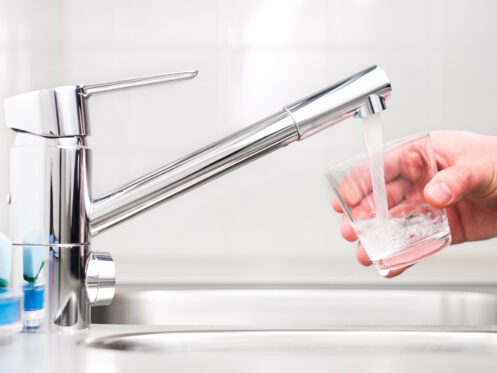The kitchen depends on water to cook, clean the area, wash dishes, and prep food. Low water pressure is a common issue, but it disrupts your routine. It takes longer to do the same tasks than it did before. Handle your frustration by determining the cause of low water pressure. This list pinpoints the areas most likely to cause low water pressure. If you can’t figure it out, let a plumber help you. The plumber will also be able to repair or replace the troublesome parts so they don’t cause another disruption.
Something Else Is On
Less water coming from the faucet may be because of another water-dependent device. The dishwasher, laundry washer, and ice maker need water to do their jobs, and it may take some from the kitchen sink. The shower, bathtub, bathroom sink, toilet, and sprinkler system are also reasons for low water pressure.
To stop dividing water between two or more water-dependent devices, only use one at a time. It is adjustable when you schedule a time to use each one and stick with it. Overall, this is a temporary solution that is fixable.
There’s a Problem With Your Plumbing
An issue with the pipe’s inside or outside lining may prevent the water from running at a high level. One reason for low water pressure is that hard water minerals restrict water flow. Check your plumbing for four other causes of low water pressure.
Does It Leak?
A leak causes low water pressure and high utility bills. The dripping wastes over four times more water than bathtub water and six times more water than dishwasher water. There may be a hole, crack, or loose joint. Should it burst, water will leak out faster. A burst pipe may also come from frozen pipes. A leak may come from the faucet when the seal or the fixture comes loose. Signs of water leaks are excess water in the cabinet or sink, water marks, musty smells, ceiling stains, and water damage.
Is It Corroding?
Most pipes today are PEX, CVPC plastic, or PVC plastic, and corrosion is less of an issue. However, if a past plumber installed iron or galvanized steel as pipe material, it would erode. Signs of pipe corrosion are metal-tasting water and reddish-brown-tinted water. Hard water contributes to this as well. Rely on plumbers from On Time Experts to replace corroded pipes in your kitchen.
Is the Water Supply Line Faulty?
The problem may not come from your pipes but from the main water supply line connecting the water heater to your house. That can leak, burst, or corrode. The way to tell is to read the meter when all the faucets are off. Keep the faucets off for four hours and reread the meter. If it goes higher, the water supply line is the problem.
Is the Municipal Water Company Using the Line?
Sometimes, the water company is making meter repairs, running tests, or cleaning it. It may affect the water pressure during this time. However, this is temporary, and the water will return to normal after they complete their task. The water provider will inform residents of changes before making them.
The Faucet Fixture May Be Faulty
If your faucet is not leaking, the aerator and cartridge may provide answers to low water pressure. They control water pressure and flow in the sink.
Check the Aerator
The mesh-like screen attached to the faucet head is the aerator. It is a filter that separates dirt and mineral calcium deposits from pure tap water. Since it’s inside the faucet head, a plumber must unscrew it to clean, repair, or replace it. Common issues are debris or sediment buildup and a faulty seal.
Look at the Cartridge
Near or underneath the faucet handle is the cartridge. It opens and closes the water valve. When you turn or lift the handle, the cartridge lets water through. When you turn it off or push it down, the cartridge closes the valve opening. A faulty cartridge may need cleaning because of sediment or hard water mineral buildup. If cleaning doesn’t work, it may need a replacement due to age or wear and tear.
Is the Cause Another Issue?
The issue may have nothing to do with the kitchen pipe or faucet. The problem may be in the sink water valve, pressure regulator, or water heater. If you have a water filtration system, check your water filter.
Sink Water Valve
The water valve resembles a hose spigot under the kitchen sink housed inside the cabinets. You rarely use them unless it’s an emergency. However, the water valve can malfunction and cause low water pressure. Sometimes, it could be your fault for banging into the valve while digging for an item stored in the cabinet. Other times, it’s wear and tear due to age or frigid temperatures. Furthermore, it may be idle for so long that it’s stuck and can’t move.
Consequently, the water valve may leak around the area. It may make banging or hissing sounds. The idleness of water valves can cause rust and mineral deposits to generate inside and outside the valve. Regardless, a plumber will double-check the water valve. It should open all the way; a slight nudge in the wrong direction can decrease the water pressure. The plumber will also replace or repair faulty or damaged parts.
Pressure Regulator Valve
Where the main water supply line connects to the house is a bell-shaped device called the pressure regulator valve (PRV). The PRV lowers water pressure from the municipal water supply outside before it reaches the home. The manufacturer pre-adjusts the water pressure before it hits the market. A plumber can readjust or replace it.
Trouble with the water or faucet will lead you to believe the pressure regulator valve malfunction is the problem. A spluttering sound, uneven pressure during a hot-to-cold switch and vice versa, and daily tasks taking longer are examples.
Water Heater Trouble
Add the water heater to the list only if your hot water has low pressure. Sediment dirt builds up at the bottom of the water heater and slows down water pressure. A plumber needs to clean that out. Water heaters with filters also need cleaning because they can get dirty and clogged. If low water pressure affects hot and cold water, it is not the water heater.
The Water Filtration System
Not all homes have a water filtration system. If you have one, you know the filter separates water from dirt and deposits. Low water pressure may come from a dirty water filter. A fresh filter may solve the problem. If it doesn’t, there may be faulty parts in the filtration system that need repair or replacement.
Our team at On Time Experts does more than repair low water pressure. We are the team to depend on for all plumbing situations, including water heaters and sump pumps. Call our experts again for heating, cooling, and air quality services. View our special offers, upfront pricing, and easy payment plans too. Contact On Time Experts for more information and to book an appointment.

